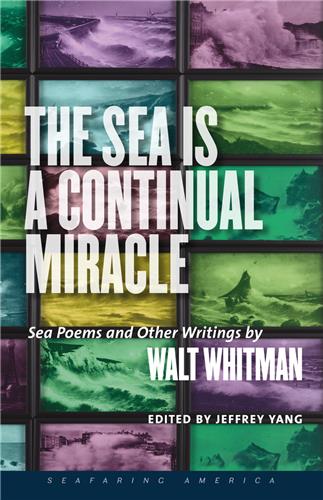Yang’s important volume provides a definitive demonstration of how the liquid and mystic power of the sea is critical to appreciating the scope of Whitman’s prodigious innovations and accomplishments.
From his earliest days on Long Island and in New York City to his last years in Camden, New Jersey, Walt Whitman lived close to the sea he knew and loved. The “liquid-flowing syllables” of Whitman’s poetry and prose tell specific stories of particular voyages and known shores, as well as vivid flights of imagination and keening paeans to wild winds, dark water, stormy and quiet airs. The land, for Whitman, is both immutable and still, while the sea is a realm of dynamic change, mercurial temper, and the ebb and flow of cosmic uncertainty. From “Mannahatta” to “Poem of Joys” to the magisterial ode to the slain President Lincoln, “O Captain! My Captain!” Whitman wove the strands of nautical lexicon and powerful imagery into the tapestry of our national literature. In The Sea Is a Continual Miracle, poet and editor Jeffrey Yang has compiled an invaluable resource for readers, students, and scholars of Whitman, and demonstrates how seeing him through sea glass shows America’s best-loved poet in a new light.


Yang’s important volume provides a definitive demonstration of how the liquid and mystic power of the sea is critical to appreciating the scope of Whitman’s prodigious innovations and accomplishments.
Jeffrey Yang has done us a service in extracting from Whitman's oeuvre a body of poetry and prose on one of the master's great themes, the oceans and rivers of his world. Yang proves a trusty guide through Leaves of Grass in its labyrinthine backtrackings and revisions. Plunging into Whitman in his company is, as ever, a cleansing and invigorating experience.
Walt Whitman has a distinctly American voice that reveals beauty and complex layered ideas in a simple lean American language, never fades with time. Endless hours can be spent with this volume and new treasures will constantly be revealed.
‘There is sea-salt in Whitman's poetry,’ wrote the great American naturalist John Burroughs of his dear friend. ‘No phase of nature seems to have impressed him so deeply as the sea, or recurs so often in his poems. ’ Jeffrey Yang's well-researched and beautifully written introduction provides compelling reasons for reading Whitman from this fresh, refreshing perspective.
WALT WHITMAN (1819–1892) is one of the preeminent poets of the American canon, known chiefly for the epic poetry of Leaves of Grass, first published in 1855 and revised many times over the course of his life. JEFFREY YANG is the author of the poetry collections Vanishing-Line and An Aquarium, the translator of Nobel Peace Prize Laureate Liu Xiaobo’s June Fourth Elegies, and the editor of two poetry anthologies. He is an editor at New Directions Publishing and the New York Review of Books, and lives outside New York City.

Founded in 1971, Brandeis University Press is a nonprofit publisher dedicated to publishing innovative, high-quality books for a general audience, as well as scholarship that advances knowledge and promotes dialogue in the humanities, arts, and social sciences around the world.
© Copyright 2024, Brandeis University Press
Brandeis University Press
Goldfarb Library 69-235, MS 046
Brandeis University
415 South Street
Waltham, MA 02453
(781) 736-4547
pressinfo@brandeis.edu

Stay up to date with the newest titles and promotions from Brandeis University Press—while saving 20% on your first purchase.